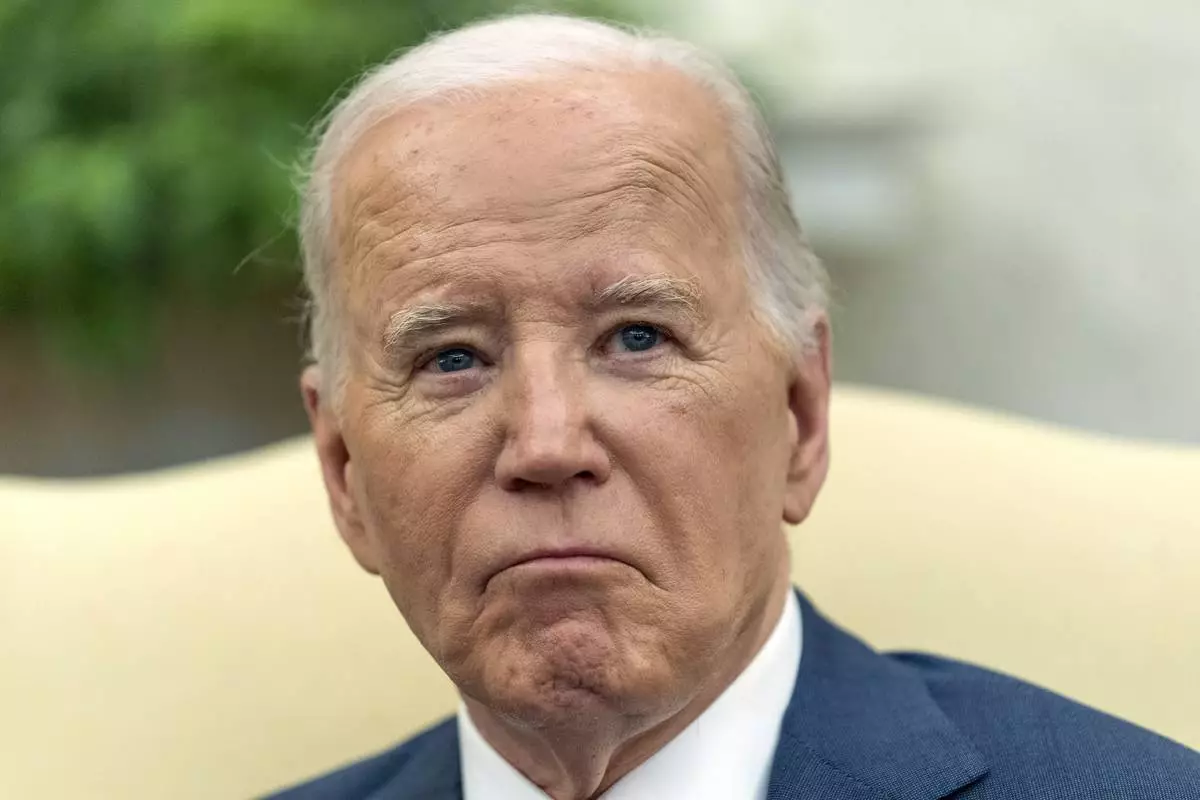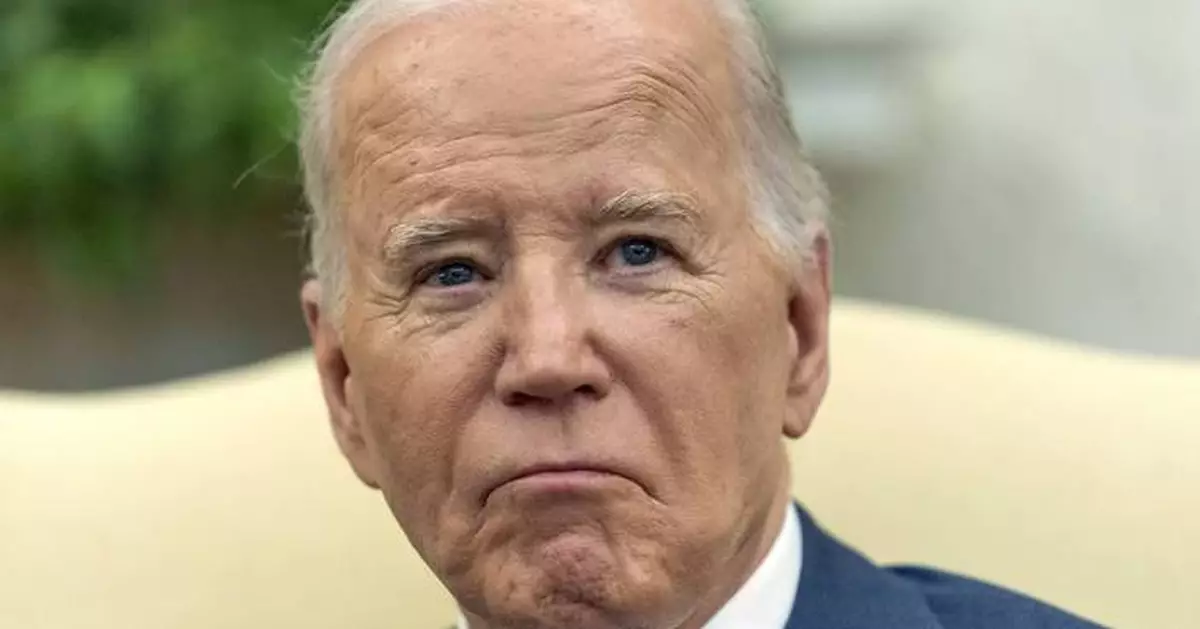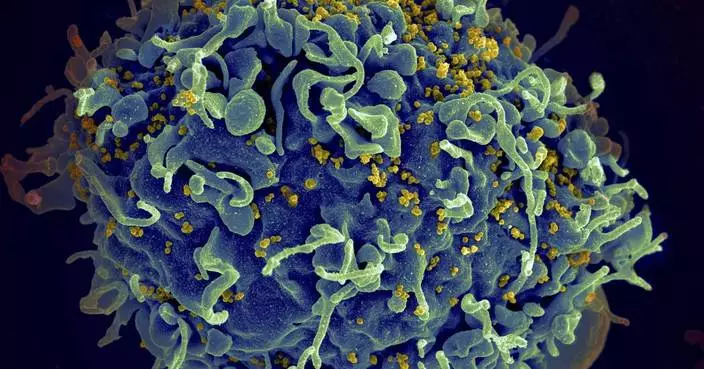WASHINGTON (AP) — President Joe Biden's administration will help 50 countries identify and respond to infectious diseases, with the goal of preventing pandemics like the COVID-19 outbreak that suddenly halted normal life around the globe in 2020.
U.S. government officials will offer support in the countries, most of them located in Africa and Asia, to develop better testing, surveillance, communication and preparedness for such outbreaks in those countries.
The strategy will help “prevent, detect and effectively respond to biological threats wherever they emerge,” Biden said in a statement Tuesday.
The Global Health Security Strategy, the president said, aims to protect people worldwide and "will make the United States stronger, safer, and healthier than ever before at this critical moment.”
The announcement about the strategy comes as countries have struggled to meet a worldwide accord on responses to future pandemics. Four years after the coronavirus pandemic, prospects of a pandemic treaty signed by all 194 of the World Health Organization’s members are flailing.
Talks for the treaty are ongoing, with a final text expected to be agreed upon next month in Geneva. It’s meant to be a legally binding treaty that obliges countries to monitor pandemic threats and share scientific findings. But major disputes have emerged over vaccine equity and transferring the technology used to make vaccines.
Even if a deal is hammered out, there would be few consequences for countries that choose not to abide by the treaty.
The U.S. will push on with its global health strategy to prevent future pandemics, regardless of a pandemic treaty or not, a senior administration official told reporters on Monday.
Several U.S. government agencies — including the State Department, the Centers for Disease Control and Prevention, Health and Human Services and the U.S. Agency for International Development, or USAID — will help countries refine their infectious disease response.
Health systems around the globe have been overwhelmed with COVID-19 and other health emergencies such as Ebola, malaria and mpox, the CDC said in a statement. The new strategy will help countries rebuild their agencies, the U.S. agency explained.
“Global health security is national security, and CDC is proud to contribute its expertise, investments and rapid response to protect the health and safety of the American people and the world,” Mandy Cohen, the CDC's director, said in a statement.
Congo is one country where work has already begun. The U.S. government is helping Congo with its response to an mpox virus outbreak, including with immunizations. Mpox, a virus that's in the same family as the one that causes smallpox, creates painful skin lesions. The World Health Organization declared mpox a global emergency in 2022, and there have been more than 91,000 cases spanning across 100 countries to date.
The White House on Tuesday released a website with the names of the countries that are participating in the program. Biden officials are seeking to get 100 countries signed onto the program by the end of the year.
The U.S. has devoted billions of dollars, including money raised from private donations, to the effort. Biden, a Democrat, is asking for $1.2 billion for global health safety efforts in his yearly budget proposal to Congress.
—
Associated Press writer Maria Cheng in London contributed.

President Joe Biden speaks during a meeting with Prime Minister Petr Fiala of the Czech Republic in the Oval Office at the White House, Monday, April 15, 2024. (AP Photo/Manuel Balce Ceneta)

President Joe Biden speaks as he meets with Iraq's Prime Minister Shia al-Sudani in the Oval Office of the White House, Monday, April 15, 2024, in Washington. (AP Photo/Alex Brandon)

President Joe Biden listens as he meets with Iraq's Prime Minister Shia al-Sudani in the Oval Office of the White House, Monday, April 15, 2024, in Washington. (AP Photo/Alex Brandon)
CHARLESTON, W.Va. (AP) — West Virginia and North Carolina's refusal to cover certain health care for transgender people with government-sponsored insurance is discriminatory, a federal appeals court ruled Monday in a case likely headed to the U.S. Supreme Court.
The Richmond-based 4th U.S. Circuit Court of Appeals ruled 8-6 in the case involving coverage of gender-affirming care by North Carolina’s state employee health plan and the coverage of gender-affirming surgery by West Virginia Medicaid.
“The coverage exclusions facially discriminate on the basis of sex and gender identity, and are not substantially related to an important government interest,” Judge Roger Gregory, first appointed by former President Bill Clinton and re-appointed by former President George W. Bush, wrote in the majority opinion.
The ruling follows a decision earlier this month by 4th Circuit judges that West Virginia's transgender sports ban violates the rights of a teen athlete under Title IX, the federal civil rights law that prohibits sex-based discrimination in schools.
Like with the transgender sports law ruling, West Virginia Attorney General Patrick Morrisey said his office planned to appeal Monday's health care case decision.
“Decisions like this one, from a court dominated by Obama- and Biden-appointees, cannot stand: we’ll take this up to the Supreme Court and win,” Morrisey said in a statement.
After the ruling, West Virginia plaintiff Shauntae Anderson, a Black transgender woman and West Virginia Medicaid participant, called her state's refusal to cover her care “deeply dehumanizing.”
“I am so relieved that this court ruling puts us one step closer to the day when Medicaid can no longer deny transgender West Virginians access to the essential healthcare that our doctors say is necessary for us,” Anderson said in a statement.
A spokesperson for North Carolina State Treasurer Dale Folwell, whose department oversees the state's health plan, said the agency was still reviewing the decision Monday but would have a response later.
During oral arguments in September, at least two judges said it’s likely the case will eventually reach the U.S. Supreme Court. Both states appealed separate lower court rulings that found the denial of gender-affirming care to be discriminatory and unconstitutional. Two panels of three Fourth Circuit judges heard arguments in both cases last year before deciding to intertwine the two cases and see them presented before the full court.
In June 2022, a North Carolina trial court demanded the state plan pay for “medically necessary services,” including hormone therapy and some surgeries, for transgender employees and their children. The judge had ruled in favor of the employees and their dependents, who said in a 2019 lawsuit that they were denied coverage for gender-affirming care under the plan.
The North Carolina state insurance plan provides medical coverage for more than 750,000 teachers, state employees, retirees, lawmakers and their dependents. While it provides counseling for gender dysphoria and other diagnosed mental health conditions, it does not cover treatment “in connection with sex changes or modifications and related care.”
In August 2022, a federal judge ruled West Virginia’s Medicaid program must provide coverage for gender-affirming care for transgender residents.
An original lawsuit filed in 2020 also named state employee health plans. A settlement with The Health Plan of West Virginia Inc. in 2022 led to the removal of the exclusion on gender-affirming care in that company’s Public Employees Insurance Agency plans.
During September’s oral arguments, attorneys for the state of North Carolina said the state-sponsored plan is not required to cover gender-affirming hormone therapy or surgery because being transgender is not an illness. They claimed only a subset of transgender people suffer from gender dysphoria, a diagnosis of distress over gender identity that does not match a person’s assigned sex.
Before offering pharmaceutical or surgical intervention, medical guidelines call for thorough psychological assessments to confirm gender dysphoria before starting any treatment.
West Virginia attorneys said the U.S. Centers for Medicare & Medicaid Services has declined to issue a national coverage decision on gender-affirming surgery.
State lawyers said West Virginia's policy is not a case of discrimination, either, but of a state trying to best utilize limited resources. West Virginia has a $128 million deficit in Medicaid for the next year, projected to expand to $256 million in 2025.
Unlike North Carolina, the state has covered hormone therapy and other pharmaceutical treatments for transgender people since 2017.

FILE - Connor Thonen-Fleck addresses reporters while his parents stand by his side, March 11, 2019, in Durham, N.C. West Virginia and North Carolina's refusal to cover certain health care for transgender people with government-sponsored insurance is discriminatory, a federal appeals court ruled Monday, April 29, 2024 in a case likely headed to the U.S. Supreme Court. (AP Photo/ Jonathan Drew, FIle)













